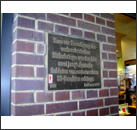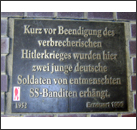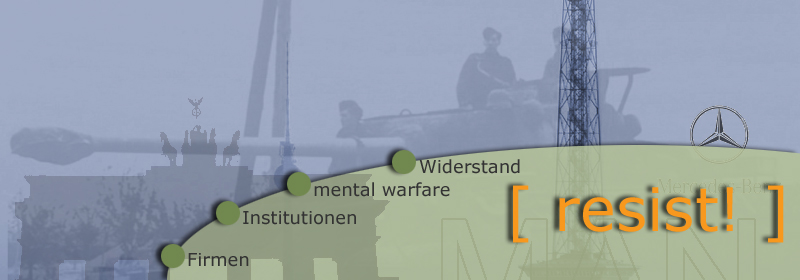Deserters
![]() Print
Print 
![]() Deserters
Deserters
 Since we can't all stand in front of the small plaque beneath the underpass, I will read the inscription to you.
It says: "Shortly before the end of Hitler's criminal war, two young German soldiers were hanged here by inhumane SS bandits."
This is the story the plaque refers to:
In April 1945, shortly before the end of the war, two German soldiers, two deserters, were sentenced to death by the SS according to martial law and hanged from the window bars of the shoe shop that existed here at the time.
Defamatory signs were hung around their necks. The aim of the public execution was to serve as a deterrent for other soldiers and the rest of the population.
Since we can't all stand in front of the small plaque beneath the underpass, I will read the inscription to you.
It says: "Shortly before the end of Hitler's criminal war, two young German soldiers were hanged here by inhumane SS bandits."
This is the story the plaque refers to:
In April 1945, shortly before the end of the war, two German soldiers, two deserters, were sentenced to death by the SS according to martial law and hanged from the window bars of the shoe shop that existed here at the time.
Defamatory signs were hung around their necks. The aim of the public execution was to serve as a deterrent for other soldiers and the rest of the population.
 This plaque was first unveiled in 1952. In early October 1990, it was removed by unknown people.
On October 20 of the same year, the "Verein Aktives Museum" unveiled another plaque, which was also removed a short time later.
Three more plaques have been attached here and each of them has been removed. The plaque only remained where you now see it when Deutsche Bahn embedded the inconspicuous, almost invisible plaque into the wall
during renovation work, thereby making it virtually impossible to remove.
The persistence with which the plaque was removed is a stark sign of the hate that deserters are still confronted with.
Another example is the speech by the Mayor of Steglitz, Herbert Weber, to mark the national day of mourning in 2004.
In his speech, Weber quotes, of all people, the ex-Nazi and Iron Cross bearer Erich Mende:
"Most deserters had something they wanted to hide and knew why they ran off! ... It is a misguidance that can only be explained by mental sickness, agitation or sedition beyond measure!
The former Navy judge and subsequent Christian Democratic Prime Minister of Baden-Württemberg, Dr. Hans Filbinger, was among those responsible for the death sentence on January 16,
1945 passed on the Navy deserter Walter Gröger. Filbinger acted as the accusing party and commanding officer of the execution party that carried out the death sentence on Gröger in March 1945.
In 1978, Filbinger was forced to resign from his post as the Prime Minister of Baden-Württemberg due to his active role in the Nazi military justice system.
His comment at that time: "I have been treated with great injustice."
The CDU posthumously honored its member on his 90th birthday: "Hans Filbinger was not a National Socialist" declared Günther Oettinger, Filbinger`s successor as Prime Minister of Baden-Württemberg.
Without any remorse and only by great external pressure did Oettinger maneuver himself out of this outrageous statement.
This plaque was first unveiled in 1952. In early October 1990, it was removed by unknown people.
On October 20 of the same year, the "Verein Aktives Museum" unveiled another plaque, which was also removed a short time later.
Three more plaques have been attached here and each of them has been removed. The plaque only remained where you now see it when Deutsche Bahn embedded the inconspicuous, almost invisible plaque into the wall
during renovation work, thereby making it virtually impossible to remove.
The persistence with which the plaque was removed is a stark sign of the hate that deserters are still confronted with.
Another example is the speech by the Mayor of Steglitz, Herbert Weber, to mark the national day of mourning in 2004.
In his speech, Weber quotes, of all people, the ex-Nazi and Iron Cross bearer Erich Mende:
"Most deserters had something they wanted to hide and knew why they ran off! ... It is a misguidance that can only be explained by mental sickness, agitation or sedition beyond measure!
The former Navy judge and subsequent Christian Democratic Prime Minister of Baden-Württemberg, Dr. Hans Filbinger, was among those responsible for the death sentence on January 16,
1945 passed on the Navy deserter Walter Gröger. Filbinger acted as the accusing party and commanding officer of the execution party that carried out the death sentence on Gröger in March 1945.
In 1978, Filbinger was forced to resign from his post as the Prime Minister of Baden-Württemberg due to his active role in the Nazi military justice system.
His comment at that time: "I have been treated with great injustice."
The CDU posthumously honored its member on his 90th birthday: "Hans Filbinger was not a National Socialist" declared Günther Oettinger, Filbinger`s successor as Prime Minister of Baden-Württemberg.
Without any remorse and only by great external pressure did Oettinger maneuver himself out of this outrageous statement.
To this day, deserters have not been socially rehabilitated and are still regarded as "traitors to the Fatherland" or "swine to comrades in arms". Their "comrades" in the armed forces, however, who led a war of genocide against European Jews, Sinti, Roma, partisans and the disabled, were allowed to maintain the myth of a "clean army". They were given a pension, were regarded as upright members of society and are allowed to commemorate their dead at events supported by the Bundeswehr in places like Mittenwald. In 2002, as a result of the untiring efforts and years of struggle, Ludwig Baumann, Chairman of the "Bundesvereinigung der Opfer der NS-Militärjustiz"("National Association for the Victims of National Socialist Military Justice", managed to obtain the repeal by the Bundestag (German Lower House) of most legal verdicts handed down by the Nazis. ?ar treason?remains an exception.
Today there still is no social recognition of the fact that deserters were also victims of Nazi injustice and acted out of resistance. Today, a number of initiatives around the world fight for the recognition of desertion as a reason for fleeing. The association Connection e.V has launched a campaign in Germany to award refugee status to US army deserters. In the USA, the War Resisters Support Campaign supports US soldiers that have deserted in their efforts to be granted asylum in Canada.
summary: deserters

